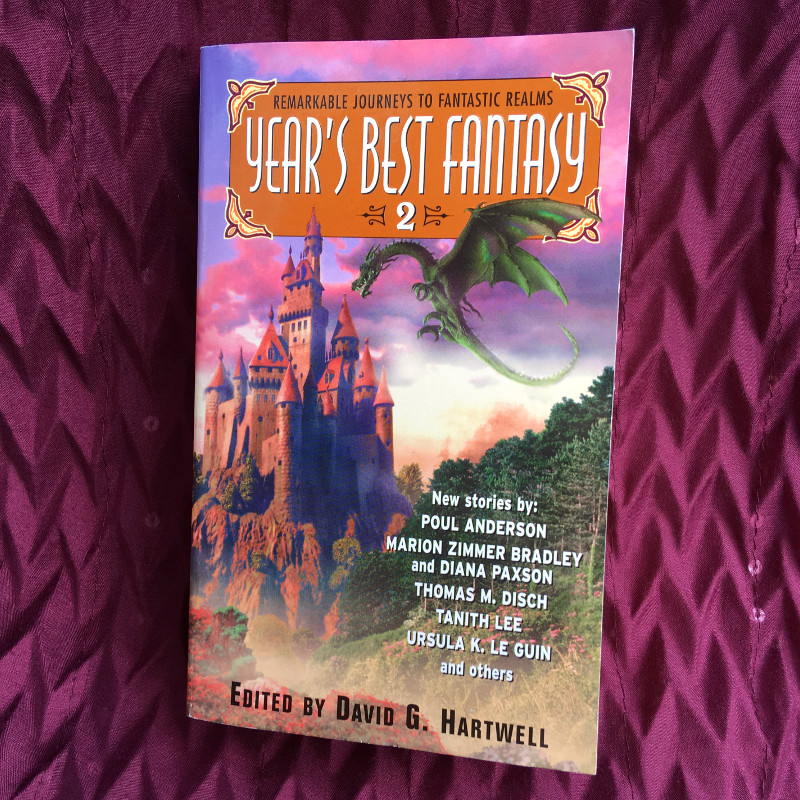Year's Best Fantasy 2
Tuesday, October 30, 2018
Last week I told you guys about my first dip into non-fairytale fantasy short stories with Ancient Enchantresses. This week I continue with Year’s Best Fantasy 2, an anthology from a totally different editor and publisher.

Review of Year’s Best Fantasy 2
Year’s Best Fantasy 2 was edited by David G. Hartwell and published in 2002 by Eos fantasy (now part of Harper Voyager). It is 492 pages long and has 22 stories. Based on the little intros, I think all of the stories were previously published in fantasy or SF magazines, other anthologies, etc. These are mostly short stories, but there are a few novelettes and at least one novella (The Finder by Ursula K. Le Guin is 96 pages long). A lot of the stories and/or authors have some sort of acclaim.
These stories are pulled from a ton of different fantasy subgenres. There are stories set in totally foreign worlds, and stories with more familiar settings. There are stories with lots of magic, and stories with just one or two magical elements. There are premises based on diseases, monsters, weird random events, time travel, religions, dystopian societies, a magical junkyard, a time-knitting granny, and very tiny people. There’s even a hobbit political/social satire piece.
Some of the stories seemed a little more typically SF than fantasy to me. I think they were included in this rather than a Year’s Best SF volume because they lacked any sort of scientific explanation for the common SF tropes within them. For instance, if a story featuring time travel has a non-magical time-machine, it would probably be considered sci-fi, but if that same story had a supernatural occurrence of time travel, that’s considered fantasy. Likewise weird abilities, even ones as mundane as being able to find objects one shouldn’t be able to find, are considered fantasy unless there’s some sort of quasi-scientific explanation about why a person is able to do that. One story seemed like a dystopian sci-fi medical horror, and I think I’d have to read it again to try to figure out why it was considered fantasy. I did enjoy it though.
There were also a number of stories that I would classify as supernatural horror or maybe weird fiction. I think these are technically subgenres of fantasy but they're not usually what pops into my head when I think of fantasy. I wouldn’t consider myself a horror reader, mostly because I read before bed to relax and angst doesn’t help me sleep, but I really enjoyed a couple of these.
As I read this book, I discovered a few things about my own personal taste. For instance, I like stories with a lot of wonder and magic in them, especially with a strong sense of place. This is difficult to do in a short work of fiction, which is why so many of the stories in this anthology have just a couple of magical elements to them instead of full-on magical worlds. For me, this made a lot of the stories too familiar. Others pulled in strange elements that I don’t care for, like two-headed characters or sentient swords. It’s a lot easier for me to connect with characters who are like me but live in a strange world than to connect with characters that are totally foreign but live in a world that’s similar to mine.
In all, I would say that this was an educational experience for me. Fantasy is a much wider genre than first comes to mind, but that narrower definition of fantasy is what I think of because that’s the sort of fantasy I like. A few of the stories I liked were outside of those subgenre bounds, but most of the stories I liked fit into the “low-tech magical fantasy world with human characters” model.
Here are my favorites:
- "What the Tyger Told Her" by Kage Baker (a touch of horror. Loved)
- "The Man Who Stole the Moon" by Tanith Lee (part of Tales From the Flat Earth)
- "Firebird" by R. Garcia y Robertson (This is the most stereotypical medieval fantasy story in the whole book, and I loved it.)
- "My Case for Retributive Action" by Thomas Ligotti (horror. Loved and hated at the same time)
- "The Lady of the Winds" by Poul Anderson (a Cappen Varra story. Admittedly my research on this is a little sketchy).
- "A Place to Begin" by Richard Parks (the story intro says this is set in fantasy China. For reasons of vocabulary I think it’s actually supposed to be Japan)
Bottom Line
The stories in this anthology are well-written and edited. I enjoyed some of them, but most aren’t my particular cup-of-tea. In the process of reading this book, I learned a lot about my own tastes and why I read the types of fantasy and historical fiction that I read. I give Year’s Best Fantasy 2 four out of seven twisty mustaches and I look forward to exploring science fiction with Year's Best SF 3 and 5, also from David G. Hartwell.

What other short fantasy fiction would you recommend to me?
Leave a comment below or my hairless ghost lemur will haunt your dreams.



0 comments